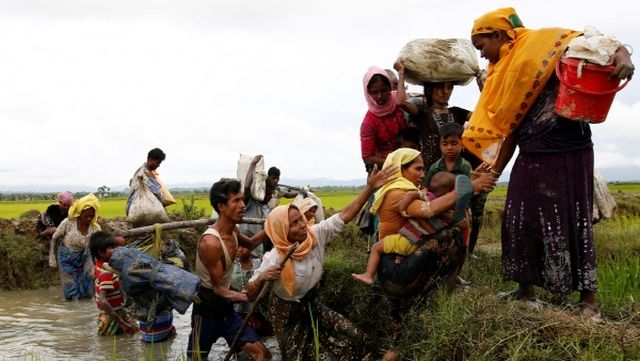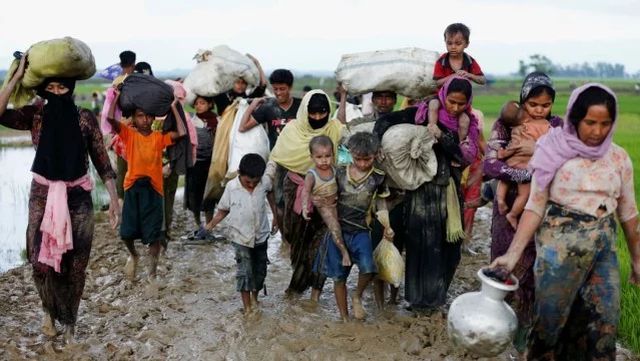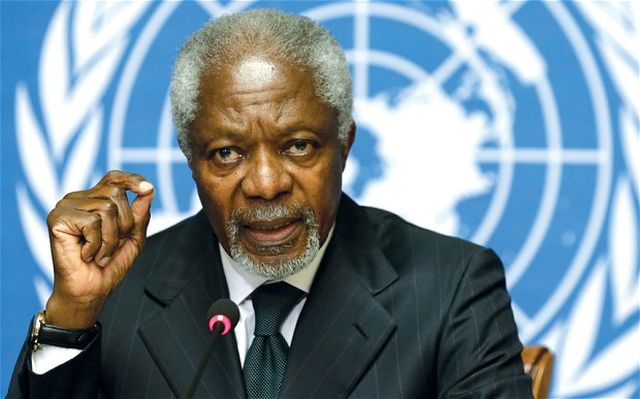
by admin | May 25, 2021 | Media, World
 Yangon : Two Reuters reporters were jailed on Monday for seven years for violating a state secrets act during their reporting of the Rohingya crisis, a court said, in the case that has drawn outrage for its attack on media freedom.
Yangon : Two Reuters reporters were jailed on Monday for seven years for violating a state secrets act during their reporting of the Rohingya crisis, a court said, in the case that has drawn outrage for its attack on media freedom.
The two journalists were being tried since 2017 for breaching Myanmar’s Official Secrets Act while investigating violence against the Rohingya Muslims in the Rakhine state by the army, the BBC reported.
Reporters Wa Lone and Kyaw Soe Oo were arrested on the night of December 12, after meeting with two police officers who, according to the defendants, handed them confidential documents, the Efe news reported.
Since then, both have been held without bail and have appeared 30 times before the court, which started a preliminary investigation on January 9 and formally filed charges on July 9.
The case has been widely seen as a test of press freedom in Myanmar.
The journalists have maintained their innocence, saying they were set up by the police.
“I have no fear,” Lone, 32, said after the verdict. “I have not done anything wrong. I believe in justice, democracy and freedom.”
The two men, who both have families with young children, have been in prison since their arrest in December 2017.
“Today is a sad day for Myanmar, Reuters journalists Wa Lone and Kyaw Soe Oo, and press freedom anywhere,” said Reuters editor-in-chief Stephen Adler.
Judge Ye Lwin told the court in Yangon the pair had “intended to harm the interests of the state”. “And so they have been found guilty under the state secrets act,” he said.
Lone and Soe Oo, 28, had been collecting evidence about the execution of 10 men by the army in the village of Inn Din in northern Rakhine.
During their investigation, they were offered the documents by two police officers, but were arrested immediately afterwards for the possession of those documents.
Authorities later launched their own probe into the killings, confirming the massacre took place and promising to take action against those who had taken part.
The BBC said that many would see this verdict as a crushing blow to freedom of the press in Myanmar and another setback for the democracy, three years after Aung San Suu Kyi’s party triumphed in free elections.
He said Lone and Soe Oo bowed their heads as the verdict was delivered. Wa Lone – who has missed the birth of his first child while being detained — protested his innocence once again as he was led away.
“We are extremely disappointed by this verdict,” Britain and the US have said, saying the court’s decision was “deeply troubling for everybody who has struggled so hard here for media freedom”.
The UN’s resident and humanitarian co-ordinator in Myanmar Knut Ostby said the UN had “consistently called for the release” of the journalists and that “a free press is essential for peace, justice and human rights for all. We are disappointed by today’s court decision”.
“The outrageous convictions show Myanmar courts’ willingness to muzzle those reporting on military atrocities,” Brad Adams, Asia director at Human Rights Watch, said.
“These sentences mark a new low for press freedom and further backsliding on rights under Suu Kyi’s government.”
The verdict comes a year after the crisis in Rakhine state came to a head when a Rohingya militant group attacked several police posts. The military responded with a brutal crackdown against the Rohingya minority.
The UN has said leading army figures in Myanmar should be investigated and prosecuted for genocide.
Media access to Rakhine is strictly controlled by the government so it is difficult to get reliable news from the region.
—IANS

by admin | May 25, 2021 | Media, World
 Singapore : US Secretary of State Mike Pompeo on Saturday called for the immediate release of two Reuters reporters detained in Myanmar for probing the persecution of the ethnic Rohingya Muslim minority in Rakhine state.
Singapore : US Secretary of State Mike Pompeo on Saturday called for the immediate release of two Reuters reporters detained in Myanmar for probing the persecution of the ethnic Rohingya Muslim minority in Rakhine state.
Pompeo said on Twitter that he spoke to Myanmar’s Foreign Minister Kyaw Tin during a meeting of the foreign ministers of the Association of Southeast Asian Nations (Asean) and its partners in Singapore, reports Efe news.
“Today at @ASEAN ministerials, I spoke with #Burma’s Minister Kyaw Tin and raised US concerns about 2 @Reuters reporters detained in Burma for doing their job. They should be released immediately,” Pompeo tweeted.
Wa Lone and Kyaw Soe Oo have been charged with securing state secrets illegally, for which they could face up to 14 years in prison.
The reporters were detained in December and a Myanmar court officially charged them on July 9 for breaching the archaic Official Secrets Act of 1923.
The reporters were investigating systematic attacks by the Myanmar army on Rohingya villages since August last year.
The offensive – that began after a series of attacks on government posts in the region by Rohingya rebels – had led to the exodus of 700,000 members of the community to Bangladesh, where they currently live in overcrowded refugee camps.
—IANS

by admin | May 25, 2021 | Interviews, Muslim World
 By Sujit Chakraborty,
By Sujit Chakraborty,
Agartala : The Rohingya influx from Myanmar to Bangladesh is a serious common security challenge for the entire region, Indian High Commissioner to Bangladesh, Harsh Vardhan Shringla said here.
“Rohingya influx from Rakhine state of Myanmar to Bangladesh is a serious and common security challenge not only for Bangladesh but for the entire region,” Shringla told IANS during an interview.
“Bangladesh has engaged itself to address the issue. They have taken up the issue with the UN. The Bangladesh government is also working through multilateral agencies besides bilateral negotiations with Myanmar.
“Bangladesh and Myanmar signed an agreement to repatriate the Rohingya Muslims. This is a humanitarian crisis even though the issue posed a common security challenge not only for Bangladesh but for all the countries of the region.”
Over 1.15 million registered Rohingya have been residing in the south-eastern part of Bangladesh, known as the Cox’s Bazar region, after they fled Rakhine to escape a military crackdown on their villages last August.
To a question about extremist activities in Bangladesh, the visiting Indian envoy said that Prime Minister Sheikh Hasina pursued a zero tolerance policy on terrorism.
“After the terror attack in Dhaka’s Holey Artisan Bakery cafe in July 2016, law and order agencies have been active against terror activities. No major incident has taken place since. The issue cannot be resolved overnight. This is a continuous process,” Shringla said.
The High Commissioner came here on Thursday and held a series of meetings with Tripura Chief Minister Biplab Kumar Deb, Governor Tathagata Roy and other senior officials.
The visiting diplomat during his meeting with Deb discussed various issues like connectivity, people to people contact, hassle free movement of Indians to Bangladesh, trade and economic activities.
The Indian envoy said that Bangladesh has been promoting peace and security not only within its territory but ensuring regional and international peace and security.
About China’s rising cooperation with Bangladesh and investment in Dhaka, the diplomat said that India’s relations with Bangladesh were enduring and sustainable.
“India’s relationship and partnership with Bangladesh was based on cooperation, mutuality of benefit and respect for each other. People to people contact is very important,” Shringla said.
The High Commissioner said that 111 agreements have been signed between India and Bangladesh in the last ten years in different sectors. India has given $8 billion in three Lines of Credit to Bangladesh.
According to the envoy, total trade between the two countries in 2016-17 was $7.5 billion while $3.3 billion worth Indian investment proposals are registered with the Bangladesh government.
He said that India is currently supplying 660 MW of power to Bangladesh from West Bengal and Tripura.
India has spent Rs 19.14 crore to create the infrastructure for the third International Internet Gateway in Agartala to get the 10 gigabit bandwidth from Bangladesh Submarine Cable Company Limited.
For this, an optical fibre cable link has been established between Akhaura (along Agartala) and Cox’s Bazar in Bangladesh.
Regarding the 2019 Bangladesh parliamentary elections next year, the Indian envoy said it was the country’s internal matter.
“Bangladesh has a vibrant democracy like ours. The country is holding periodic elections. We look forward to a very free and fair process of election in Bangladesh.”
He said that India-Bangladesh relations were based on common history, language, culture besides a common border of over 4000 km.
“Today we are enjoying the best ever relations. During the past 10 years, relations have improved enormously. Cooperation, friendship and partnership are beneficial for both the countries.
“The countries have invested significantly to develop infrastructure along the borders to promote trade among the two neighbours. The border infrastructure is being further developed to enhance trade and economic activities between the two nations.
“Currently 36 land customs stations (LCS) are operational along the India-Bangladesh border. Further upgradations were being done along the Assam, Meghalaya, Tripura besides West Bengal borders,” he added.
Shringla said that to further improve the ongoing bus services between Dhaka, Kolkata, Agartala, Shillong and Guwahati, more steps would be taken to make the bus services more effective as it is inexpensive for people of both the countries.
Five Indian states – West Bengal (2,216 km), Tripura (856 km), Meghalaya (443 km), Mizoram (318 km) and Assam (263 km) share the 4,096-km border with Bangladesh.
—IANS

by admin | May 25, 2021 | World
 Nay Pyi Taw : The ethnic cleansing of the Rohingya Muslim minority in Myanmar is continuing in Rakhine state, from where at least 700,000 people have fled to Bangladesh since August 2017, the UN said Tuesday.
Nay Pyi Taw : The ethnic cleansing of the Rohingya Muslim minority in Myanmar is continuing in Rakhine state, from where at least 700,000 people have fled to Bangladesh since August 2017, the UN said Tuesday.
The UN and human rights organisations have repeatedly criticised the atrocities allegedly committed by the Myanmar military in a campaign against the Rohingya that began in northern Rakhine following a coordinated assault by the Rohingya insurgent movement on August 25, 2017, reports Efe news.
UN Assistant Secretary-General for Human Rights Andrew Gilmour said that while the level of violence had been reduced, murder, rape, torture, abductions as well as forced starvation continued.
“It appears that widespread and systematic violence against the Rohingya persists,” Gilmour said in a statement issued after his visit to refugee camps in Bangladesh.
“The nature of the violence has changed from the frenzied blood-letting and mass rape of last year to a lower intensity campaign of terror and forced starvation that seems to be designed to drive the remaining Rohingya from their homes and into Bangladesh,” he added.
The UN expert also questioned how the Myanmar government could say that it was ready for the return of the Rohingya refugees while atrocities committed against them continued, and argued that “safe, dignified and sustainable returns are of course impossible under current conditions”.
Gilmour also praised the humanitarian response of Bangladesh and other international organizations to the Rohingya refugee crisis, but warned that the rainy season could leave “a devastating effect” on the refugee camps.
Bangladesh and Myanmar signed an agreement to start repatriating the Rohingya refugees at the end of January but the deal was suspended at the last minute by the Dhaka government.
The Myanmar military has denied claims of abuses, but in January recognised the extrajudicial killings of Rohingya in September 2017.
Myanmar does not recognize Rohingya as its citizens, arguing they are illegal immigrants from neighbouring Bangladesh, which has led to continued discrimination against the Rohingya community as well as restrictions on their freedom of movement.
—IANS

by admin | May 25, 2021 | World

Former UN Secretary General Kofi Annan
Nay Pyi Taw : A Myanmar government committee investigating the Rohingya Muslim minority in Rakhine state said adhering to the rule of law was the best means to resolve the ongoing humanitarian crisis, an statement said on Friday.
A panel was set up this week to find “pragmatic” solutions to restore “security and the rule of law” in Rakhine, from where hundreds of thousands of Rohingya minority Muslims have fled to Bangladesh since an August 25 rebel attack on military and police outposts, reports Efe news.
The committee was convened to implement recommendations presented on August 24 by the Advisory Commission, a group of international observers led by former UN Secretary General Kofi Annan, the statement said.
A day before the current violence erupted, Annan had presented a plan to Myanmar authorities to deal with the sectarian problems between the Rohingya and the Buddhist majority gripping Rakhine state.
The UN estimates that at least 370,000 have so far fled across the border with about a 1,000 casualties since the crisis erupted.
Meanwhile, Zaw Htay, a spokesman for Myanmar’s Presidential Office, said the reason people abandoned their homes was because many were told to leave by family members who were involved in terrorist activities.
“Some of them are directly involved with terrorist activities and some are sympathizers for the terrorist group,” Zaw Htay wrote in an email to CNN on Thursday.
“And some are running away to avoid arrest by police because they had some connections with the terrorist group.”
The government has said that 176 out of 471, or 37.4 per cent of all Rohingya villages were now empty of people, and an additional 34 villages were “partially abandoned”.
The UN Secretary-General, Antonio Guterres, when asked on Wednesday if he considered the displacement of thousands of Rohingyas to be ethnic cleansing, said: “When one-third of the Rohingya population has got to flee the country, can you find a better word to describe it?”
“I call on Myanmar authorities to suspend military action, end the violence, uphold the rule of law and recognize the right of return of all those who had to leave the country.”
Prior to the current wave of violence, Myanmar’s population of Rohingya was estimated to number about 1 million.
—IANS

 Yangon : Two Reuters reporters were jailed on Monday for seven years for violating a state secrets act during their reporting of the Rohingya crisis, a court said, in the case that has drawn outrage for its attack on media freedom.
Yangon : Two Reuters reporters were jailed on Monday for seven years for violating a state secrets act during their reporting of the Rohingya crisis, a court said, in the case that has drawn outrage for its attack on media freedom.



